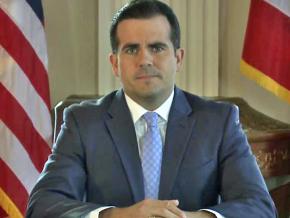Don’t privatize Puerto Rico’s electric power
In late January, Puerto Rican Gov. Ricardo Rosselló announced plans to privatize the Puerto Rican Electric Power Authority (PREPA, by its initials in English; AEE by its Spanish initials). It is a terrible, but not unexpected, stage in a still-disastrous situation, where as many as one-third of residents remain without power four months after Hurricanes Maria and Irma.
Rosselló, whose promise to have 95 percent of power restored by Christmas went by the board, said his government "will sell shares in AEE to firms that will transform the power generation system." His televised address was filled with the well-worn buzzwords used to justify previous schemes for privatizing other public services, like health care, telecommunications and the island's main airport. The new system, Rosselló said, will be "modernized and less costly" and "consumer-centered...where you will have choices."
At a press conference after Rosselló's January 23 address, Ángel Figueroa Jaramillo, president of the electrical workers union (UTIER, in its Spanish initials), brushed off the governor's claims, saying "We will never fall for the government' game of using the people's suffering [to push through its agenda]."
In the face of these developments, the socialist newspaper Bandera Roja, published by the Movimiento Socialista de Trabajadores y Trabajadoras (MST, or Socialist Workers Movement), published the following statement denouncing the long history of corruption and mismanagement of the power authority under the island's two main parties, the Popular Democratic Party (PPD) and Rosselló's New Progressive Party (PNP). The statement also notes how the years of austerity under PREPA's restructuring officer, the corporate "turnaround" specialist Lisa Donahue, weakened the power grid further.
THE SOCIALIST Workers Movement (MST) condemned Gov. Ricardo Rosselló announcement that he plans to liquidate assets of the Electric Power Authority (AEE) to privatize it. This is a frontal attack on this strategic industry. Not only will the privatization scheme hand over profits and the wealth of this industry to stockholders, but it also leaves the future of any economic development project in the hands of certain unscrupulous businesspeople.
"The energy crisis in Puerto Rico is a direct consequence of the collapse of industry, of the corrupt management of entrepreneurs and privatizers inside the AEE and of the lack of accountability for any government officials, whether PPD or the PNP, who are responsible for mismanaging the public corporation," said Hugo J. Delgado-Martí, spokesperson for the MST.
"The privatization projects are responsible for the deepening of the crisis and particularly for the PREPA's lack of capacity to respond to Hurricane Maria. The measures Lisa Donahue took--reducing emergency inventory, eliminating the jobs of highly trained employees and liquidating maintenance and prevention--are the factors that today keep the electrical system on its back," Delgado-Martí added.

The Authority's current crisis has been deliberately engineered, the MST said. According to data obtained from PREPA's financial statements, there has been a significant and constant reduction in annual investment in maintenance: from $251 million in 2007 to $202 million in 2014. In the last five years, more than 5,000 workers have been forced into retirement because of changes in and threats to dismantle the retirement system. Of those, 85 percent were line workers and plant operators who currently don't have enough money in these times of increased need.
"The collapse that occurred after Hurricanes Irma and María could have been prevented--or at least mitigated--if it weren't for neoliberal policies that view electric power as a means to make bondholders rich instead of seeing it as an essential public service," Delgado-Martí said.
Privatization of the Electric Power Authority will cause similar or worse effects in the economy and public administration as those caused by the privatization of the health care system in the 1990s, according to the MST. In the case of health system privatization, public spending tripled in 10 years. The result is that today, the health system serves a much smaller number of people than it did under the Health Card system.
"Health care, education and electric power are essential services for the people. Privatizing them will transform scarcity into the norm, since capitalists benefit from scarcity, which allows them to charge more. This would cause something similar to the effect we saw during the worst moments after the recent hurricanes," he concluded.
First published in Spanish by the Movimiento Socialista de Trabajadores y Trabajadoras and translated into English by Lance Selfa. Monique Dols contributed to this article.


